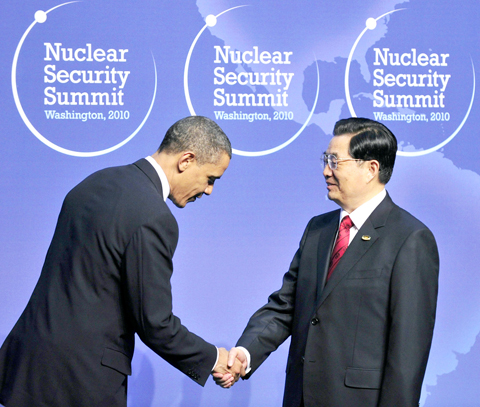China said yesterday it wanted any UN Security Council action on Iran to promote a diplomatic way out of the nuclear standoff, edging closer to openly backing a resolution while hedging on sanctions.
The remarks from Chinese Foreign Ministry spokeswoman Jiang Yu (姜瑜) followed a meeting on Monday between Chinese President Hu Jintao (胡錦濤) and US President Barack Obama in which, said a US official, Hu agreed his government would help craft a new Security Council resolution pressing Iran over its nuclear activities.
Jiang was not so blunt, but her comments appeared to leave scant doubt that Beijing accepts that fresh Security Council action over Iran is coming, even if China wants room to negotiate over the sanctions proposed by Western powers.

PHOTO: EPA
“We believe that the Security Council’s relevant actions should be conducive to easing the situation and conducive to promoting a fitting solution to the Iranian nuclear issue through dialogue and negotiations,” Jiang told a news conference in Beijing, answering a question about the talks between Hu and Obama in Washington. “We support protecting the international nuclear non-proliferation regime and peace and stability in the Middle East, and oppose Iran possessing nuclear weapons.”
China has close energy and economic ties with Iran and has been reluctant to back tougher sanctions, but Beijing has backed past rounds of UN sanctions against Iran, and in New York last week five other key powers supported talks on possible new sanctions.
“China seems in principle to accept that there will be a new Security Council resolution with sanctions, otherwise we simply wouldn’t have discussions on a draft,” said Zhu Feng, a professor of international relations at Peking University. “But the question is what level of sanctions will be in the resolution, and that will be the focus of negotiations.”
Beijing is one of five permanent members of the UN Security Council, each with the power to veto any proposed resolution. The five powers and Germany together make up the “P5+1” group that steers international talks on the Iran nuclear dispute.
US and Chinese officials who briefed reporters after the Hu-Obama talks described a positive atmosphere on Iran, which Western powers say is seeking the ability to make nuclear weapons, contravening atomic security safeguards.
Iran says its nuclear activities are for peaceful ends.
The dispute has long been a thorny one for China, which is a big oil customer of Iran and has also long been skeptical of the effectiveness of international sanctions.

A Ministry of Foreign Affairs official yesterday said that a delegation that visited China for an APEC meeting did not receive any kind of treatment that downgraded Taiwan’s sovereignty. Department of International Organizations Director-General Jonathan Sun (孫儉元) said that he and a group of ministry officials visited Shenzhen, China, to attend the APEC Informal Senior Officials’ Meeting last month. The trip went “smoothly and safely” for all Taiwanese delegates, as the Chinese side arranged the trip in accordance with long-standing practices, Sun said at the ministry’s weekly briefing. The Taiwanese group did not encounter any political suppression, he said. Sun made the remarks when

The Taiwanese passport ranked 33rd in a global listing of passports by convenience this month, rising three places from last month’s ranking, but matching its position in January last year. The Henley Passport Index, an international ranking of passports by the number of designations its holder can travel to without a visa, showed that the Taiwan passport enables holders to travel to 139 countries and territories without a visa. Singapore’s passport was ranked the most powerful with visa-free access to 192 destinations out of 227, according to the index published on Tuesday by UK-based migration investment consultancy firm Henley and Partners. Japan’s and

BROAD AGREEMENT: The two are nearing a trade deal to reduce Taiwan’s tariff to 15% and a commitment for TSMC to build five more fabs, a ‘New York Times’ report said Taiwan and the US have reached a broad consensus on a trade deal, the Executive Yuan’s Office of Trade Negotiations said yesterday, after a report said that Washington is set to reduce Taiwan’s tariff rate to 15 percent. The New York Times on Monday reported that the two nations are nearing a trade deal to reduce Taiwan’s tariff rate to 15 percent and commit Taiwan Semiconductor Manufacturing Co (TSMC, 台積電) to building at least five more facilities in the US. “The agreement, which has been under negotiation for months, is being legally scrubbed and could be announced this month,” the paper said,

Japan and the Philippines yesterday signed a defense pact that would allow the tax-free provision of ammunition, fuel, food and other necessities when their forces stage joint training to boost deterrence against China’s growing aggression in the region and to bolster their preparation for natural disasters. Japan has faced increasing political, trade and security tensions with China, which was angered by Japanese Prime Minister Sanae Takaichi’s remark that a Chinese attack on Taiwan would be a survival-threatening situation for Japan, triggering a military response. Japan and the Philippines have also had separate territorial conflicts with Beijing in the East and South China